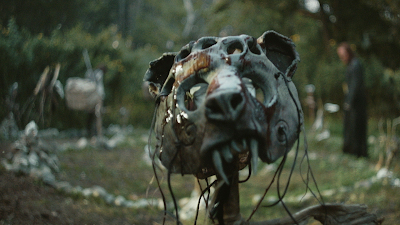Paramount+'s Pet Sematary: Bloodlines, directed by Lindsey Anderson (Chaos Walking) Beer, who cowrote with Jeff (Pet Sematary '19) Buhler, is a prequel to either the latter parenthesized or (if one so chooses) the 1998, Mary Lambert take on Stephen King's bestseller, not to mention Lambert's 1992, Pet Sematary Two, all of which pull from W.W. Jacobs' perennial "The Monkey's Paw."
This chapter takes place in 1969 and focuses on Jud Crandall's early years before he uttered the profound adage, "Sometimes, dead is better."
Crandall, portrayed by Jackson White, is a young man who should have been drafted, but hasn't been, perhaps because his dad, played by Henry Thomas, has set it up so that his son can instead join the Peace Corps. That leaves locals a tad suspicious, if not resentful of the lad, in particular David Duchovny's Bill Baterman, whose son, Jack Mulhern's Timmy, died in Vietnam. Even so, the former soldier is seen walking about the Baterman estate, acting (to say the least) peculiar. (Pet Sematary fans are familiar with the Baterman story, since it figures into King's novel and impacts the adaptations.)
Crandall becomes most concerned about his old friend, after Baterman's dog mauls his girlfriend, Natalie Alyn Lind's Norma, getting little reaction from the pallid vet. Crandall shares the grisly episode with his pal, Forest Goodluck's Manny Rivers, who assumes Baterman's reputed nonchalance a result of war fatigue.
The excuse doesn't hold up, for Ludlow's Mi'Kmaq burial ground is well known to its elder residents, even if preferred unmentioned. In addition to Timmy's dad, Jud's dad knows its sordid history, as does Pam Grier's Marjorie, Matt Holland's Benson and Christian Jada's Sheriff Anderson. They decide to snuff the accursed residue, but Baterman's resurgence has prodded things a little too far, as Manny's sister, Isabelle Star LaBlanc's Donna (a maker of ominous, Mi'Kmaq masks) discovers.
The ensemble's valiant efforts lead to a temporary fix at best, as Bloodlines creates a Faustian force that beckons what came before and projects what will come again. In fact, to drive this echoing motif home, the prequel holds a flashback, depicting how explorer Karl Graboshas' Commander Williams came upon the indigenous madness in 1674. (The segment would have made a fascinating feature on its own accord and could yet be expanded.)
When all is said and done, Bloodlines feels like Bob Clark's Deathdream, another "Monkey Paw" variant about a slain Vietnam vet resurrected through a mother's misguided prayers. As such, there's great regret at the story's heart, which taps straight into King's message: Secrets are cloistered for only so long; the same applies to evil.












No comments:
Post a Comment